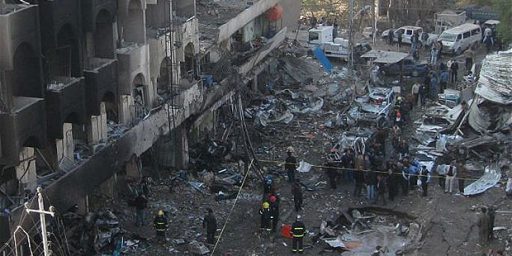Surge Based on Faulty Premise?
John Robb offers an incredibly pessimistic outlook:
[T]he failure of these periodic efforts may be due to a failure to revisit a key assumption upon which the present US effort is based: that strong states tend to form naturally if provided the right minimalist conditions. I believe the opposite is true: that states, once broken, tend to remain hollow and in perpetual failure. The reason is that in the current environment minimalist conditions yield social disintegration and the ascendent military power (copiously documented on this weblog) is in the hands of those would disrupt the state rather than form it. If this revised assumption is correct, it is safe to conclude that building a stable Iraq would require a level of effort that is beyond our ability to provide (see the brief “Playing with War” for more).
By contrast, Thomas Barnett is hopeful that the “belated attempt at Development in a Box” will work, observing, “these changes don’t come about because they’re cool or visionary. They come about because the failures demand them.”
Not much doubt about that much.
UPDATE: Cicero at WOC seconds Robb: “The President’s Iraq plan assumes that there is a cogent, non-sectarian, uncorrupted Iraqi national government to partner with. I propose that this is an illusion, laid bare by Saddam’s mob-like execution at the hands of revenging Shi’a. There is no real national government in Iraq that represents all the factions. I don’t believe it is possible at this hour.”
Andrew Sullivan echoes that sentiment:
The premise of the speech, and of the strategy, is that there is a national democratic government in Baghdad, defending itself against Jihadist attacks. The task, in the president’s mind, is therefore to send more troops to defend such a government. But the reality facing us each day is a starkly different one from the scenario assumed by the president. The government of which Bush speaks, to put it bluntly, does not exist. The reality illumined by the lynching of Saddam is that the Maliki government is a front for Shiite factions and dependent for its future on Shiite death squads. U.S. support for the government is not, therefore, a defense of democracy in a unified country, whatever our intentions. It is putting the lives of American soldiers in defense of the Shiite side in an increasingly brutal civil war.
It’s not inconceivable, though, that decisive action could change this, though. The reason Maliki’s government is “dependent for its future on Shiite death squads” is the lack of security, not some deep-seated cultural imperative. In a state of anarchy, people pick sides. That’s the reason inner city teenagers join gangs, Moscow shopkeepers pay off the Russian mafia, and Maliki appeases Sadr. The questions are whether the underlying conditions are intractable and whether the will of outside forces to overcome the inertia is sufficiently strong.






Disturbingly, I find myself agreeing with Sullivan. Every time some militia types brazenly walk out and kidnap people in broad daylight, it underlines the fact that the nominal Iraqi gov’t just doesn’t run the place. But the administration’s refusal to admit that there’s a civil war going on there forces them to also be unable to acknowledge the fact that the gov’t we built just isn’t functioning either.
Remember when the USSR collapsed? I recall reading an article, it may have been in Foreign Affairs, about what had happened after the fall of the central gov’t – with no real authority there was not, for example, a credible police force. With no way to enforce or protect property rights, organized crime became the de facto gov’t in many parts of Russia. I think we’re seeing similar things in Iraq…
I’m not sure that’s right, James. I think that Maliki’s promises to crack down on militias are somewhat like a leader of the Crips promising to crack down on gangs. He may be sincere and his statement may be true but it won’t bring an end to gang warfare.
Similarly, Maliki is a creature of the militias. Will he crack down on his own?
It’s not inconceivable, though, that decisive action could change this, though.
Conceivable, just not all that likely.
Typo in your title, JJ:
“Surge Based on Faulty President.”
Fixed!
Why is his outlook ‘incredibly pessimistic’ Given the administrations track record of failure in Iraq, I think pessimism makes perfect sense. We are being led by people who don’t know what they are dong.